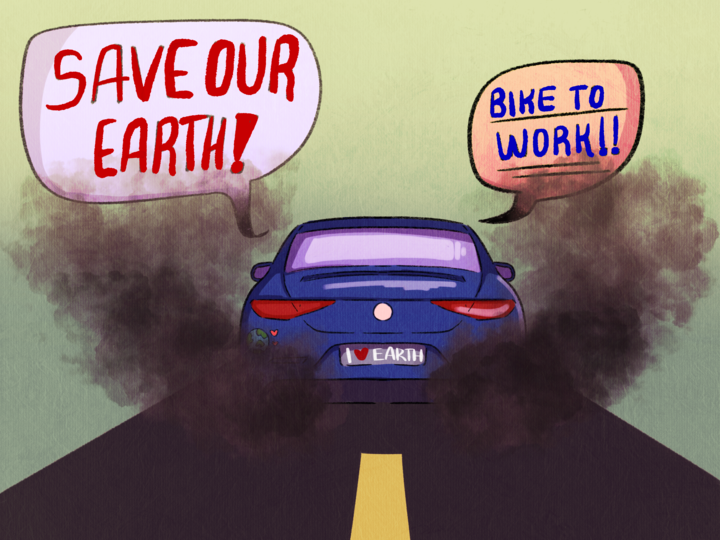Our world as we know it is being ravaged by a new kind of villain: the unassuming hypocrite, clad in an armor of feigned knowledge (or perhaps willful ignorance) and wielding social media as a dagger.
The unassuming hypocrite talks a big game about environmentalism, singing the praises of public transportation and walkable cities, but drives an SUV half a mile to and from the supermarket and doesn’t know how to ride a bike. The unassuming hypocrite implies that your complaints about being overworked are rooted in procrastination and mismanagement, but has never had a job and is only enrolled in 12 units of coursework at any given time. The unassuming hypocrite rants about how everyone is addicted to technology, but gives you a strange look if you don’t understand their reference to a particular niche of online culture.
The unassuming hypocrite is no master masquerader. If one simply looks, they can be found everywhere. It’s time to band together and fight back against their evil forces descending upon our honest and sincere world!
Leo Tolstoy once said, “Everyone thinks of changing the world, but no one thinks of changing himself.” Even Gandhi expressed a similar sentiment: “Be the change you want to see in the world.” And finally a personal quote from my own coffers: “Yes, it’s about you and me too, you doofus.”
We, as a collective, have become far too tolerant of the spread of hypocrisy. Having managed to convince ourselves that we can hold within us any number of conflicting opinions without suffering the consequences, we have entered an age of intense, willful cognitive dissonance.
Consider the following example of the online discussions surrounding performative activism that bubble up once every few months. The situation usually evolves in a similar manner:
Step 1: Multiple people repost informative graphics on social media about the pertinent world conflict that they want to bring awareness to.
Step 2: Multiple people repost informative graphics with a reminder to their followers that if they aren’t doing anything to help resolve the pertinent world problem (apart from reposting informative graphics), then they are actually also part of the problem.
Step 3: Multiple people repost informative graphics stating that social media is actually a very tangible way of taking action to solve the pertinent world problem, because it raises awareness.
Step 4: Multiple people repost informative graphics about how we need to accept that two contradictory things can be true at once. We can repost informative graphics about the pertinent world problem on social media to raise awareness for it, and we can also realize that this might not be the most effective way to contribute to the ultimate resolution of the pertinent world problem.
Step 5: the pertinent world problem recedes in the collective consciousness, becoming just another world problem.
At this point, there is no further evolution. The cycle is simply repeated when a new pertinent world problem arises.
What I see here is not a question of whether or not social media is an effective tool for solving world problems (although that is certainly a topic worthy of discussion); rather this is a situation in which nobody seems to know how to lead a productive debate. One person presents an argument against social media activism and another person counters the argument. Yet, instead of the exchange continuing, and the involved parties agreeing to disagree or even changing their minds, each individual decides to consider both opinions true.
There are plenty of diverse and contradicting views held by people around the world, most of which are based on some form of personal reasoning that is logical to (at minimum) the belief-holders themselves. Still, these clashing perspectives are intended to be held by different, completely individual people. One person alone should not be able to believe in a set of contradicting opinions without unleashing an intense and unpleasant internal cognitive dissonance upon themselves.
It seems that we have forgotten that cognitive dissonance can be resolved.
Broadly speaking, if an individual is presented with two plausible but conflicting opinions, this should lead to some form of internal dialogue or debate. Perhaps the individual then conducts further research on a related topic or contemplates whether their personal experiences align more closely with one of the two beliefs. Then, the individual chooses which opinion to align with, or perhaps creates a third opinion that incorporates some additional component. Regardless, a choice is made; a choice which then informs the life and actions of that individual.
If you learn that Amazon is incredibly environmentally harmful and conclude that you do not want to support such behavior, then make a deliberate effort to reduce Amazon’s presence in your life. Find local alternatives to products that you used to buy from them, consolidate your orders into larger occasional shipments and stop paying for Amazon Prime.
Some changes may be unaffordable or inaccessible to you, so just consider the kinds of adjustments and sacrifices that you can reasonably sustain. Align your newly-constructed opinion with your actions in a measured and considered manner.
If you make a mistake along the way, so be it. Don’t be too harsh on yourself, but also don’t soothe yourself for acting in a way that is incongruent with your established values.
Think of yourself as being in relationship with your values. If another person acted with blatant disregard for your values, you would either extract that person from your life or demand an apology from them. In this same way, when you act with blatant disregard for your own values, challenge yourself to correct your mistakes in an actionable way. Hold yourself accountable. If nobody else questions you, will you question yourself?
Of course, the concept of accountability is nothing new. In fact, it’s a hot topic on social media. Despite the mountains of content on the subject, I have hardly ever seen anybody attempting to truly hold a non-celebrity accountable. When we see that one girl who never wears the same outfit twice, and who purchases hundreds of dollars worth of new clothing per month, repost an infographic about the unethical production practices of Shein, we no longer bat an eye. This kind of behavior is normalized. Even worse, it’s commonplace.
It goes without saying that it can be difficult to completely align one’s ideologies with one’s life actions. News and social media present us with an unfathomable number of problems everyday, asking us to form an opinion and take action on almost anything. If we were to actually attempt to develop a stance and contribute to the resolution of every problem we learn about, we would quickly find ourselves stretched far too thin. I am not proposing that we do absolutely everything possible — simply that we try to do something.
But regardless of whether it’s an overconsumption of media content desensitizing us to our own hypocritical tendencies or simply a growing pessimism about our ability to make a difference in the world, we need to snap out of it. Allow your knowledge of pervasive everyday hypocrisy to reflect back on yourself rather than directing criticism at others and consider how you can be better.
It’s not us versus them; it’s us versus ourselves.
Follow the Daily Wildcat on Instagram and Twitter/X

Fiona Sievert is an undergraduate at the University of Arizona double majoring in Anthropology and East Asian Studies with a minor in German Studies. She loves languages, wearing funky outfits, and (occasionally) being a dirtbag in the great outdoors!









